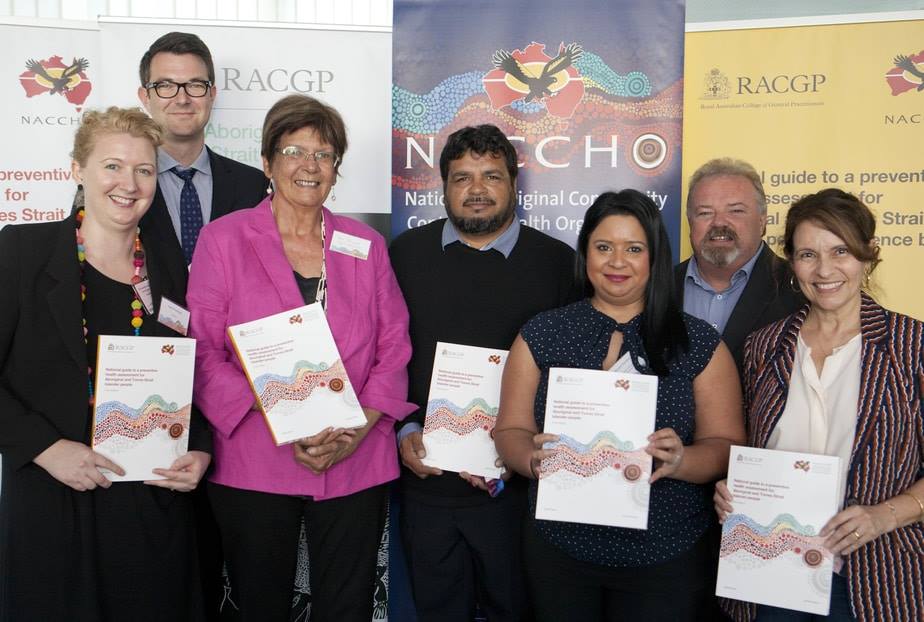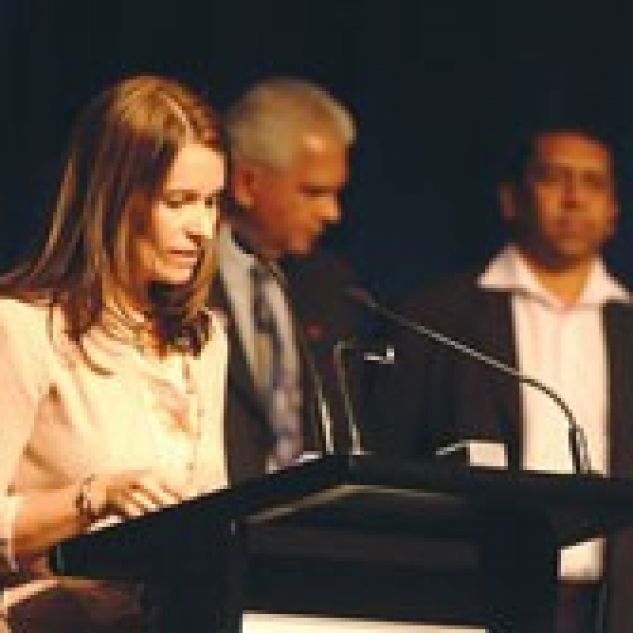Written By
Nicolette Ward
College of Medicine and Dentistry
Publish Date
19 January 2022
Related Study Areas
JCU Associate Professor's reflections working in Aboriginal and Torres Strait Islander Health
After 30 years of working within the Aboriginal Community Controlled Health Service (ACCHS) sector, JCU Associate Professor in General Practice and Rural Medicine, Dr Sophia Couzos, reflects on the milestones that have been achieved for Aboriginal and Torres Strait Islander health, as well as the work that is still yet to be done.
Despite originally hailing from Melbourne, a passion for rural and remote health emerged early in Sophia’s career as a General Practitioner.
“After first completing a degree in microbiology and working in that field, I decided to pursue medicine and finished my medical degree in Melbourne in 1987. In those days there was absolutely no training about the health of Aboriginal peoples and Torres Strait Islanders, nor in health systems science. The training was all biomedical and as students, we did all of our clinical rotations in large city hospitals.
“I first became interested in the health of Aboriginal peoples when I was working as a microbiologist at the Western [General] Hospital in Victoria and was curious about infectious diseases associated with socioeconomic disadvantage. Infection rates were presenting much higher for Aboriginal population groups, but there was very little attention being paid to the causes of these issues.
“After graduating from medicine, I wanted to pursue a rural and remote health career pathway and so after being trained in the [now defunct] Fairfield Infectious Diseases Hospital, Royal Melbourne Hospital, and Royal Children’s Hospital in Melbourne, I spent time in rural Victoria gaining obstetric, neonatal, and general practice experience before heading to the Kimberley region of Western Australia.
GP training in the Kimberley region
“I arrived in Kununurra in the East Kimberley region in 1991, prompted by a Melbourne colleague and friend, [Emeritus Professor] Dr Ian Wronski [AO], who had taken up a position in Broome as the first Director of Health Services for the Kimberley Aboriginal Medical Services Council and Medical Director of the Broome Regional Aboriginal Medical Service.
“I then completed my General Practice (GP) training within the East Kimberley Aboriginal Medical Service (now known as the Ord Valley Aboriginal Health Service), and the Broome Regional Aboriginal Medical Service.
“Training remotely and wholly within the Aboriginal community-controlled health sector was at that time, an uncommon thing to do. These health services were established by some of the most inspiring people I have ever met, who were committed to offer communities quality, culturally appropriate primary healthcare that was unavailable from within mainstream health services.
“The work also involved admitting and looking after hospital inpatients, so effectively I was working as a rural generalist, but we didn’t have those terms back then. It was very much a new model of training and the start of a change in the training and recognition of rural health practitioners.”

Image: Dr Sophia Couzos (far right) at the 2018 launch of the RACGP’s National Guide to a Preventive Health Assessment for Aboriginal and Torres Strait Islander people.
Aboriginal community-controlled health services
Sophia would spend the next 14 years in the Kimberley region, working within the network of Aboriginal community-controlled health services (ACCHS) in the region and becoming an advocate for community-led healthcare delivery.
“These are health services established by Aboriginal peoples, for Aboriginal peoples which means that doctors are working within those community governance structures. You don't have that hierarchical structure where the doctor sits at the top and everyone else is at the bottom; it's real teamwork.
“The ACCHS model of care was effectively a game-changer as it flipped the health system power structures towards being more patient-centred, well before the term had even been invented!
“Working within this health workforce structure of predominantly local Aboriginal community members means that the work you do is so much more effective because you're actually embedded within that cultural environment.
“Aboriginal peoples themselves are best equipped to identify the problems that are a priority and who are then able to model the preferred type of health care to address those needs. So having a health workforce made up of majority local Aboriginal peoples or Torres Strait Islanders is absolutely vital to improving health outcomes of their communities.
“We often use terms like Primary Health Care without understanding what they really mean but it is best exemplified by the comprehensive model of care delivered by Aboriginal community-controlled health services in which patients’ healthcare needs are treated as a continuum across their lifespan, in a ‘one stop-shop’ context, that also provides a strong focus on health promotion and preventative health care.”
Closing the Gap with NACCHO
Undertaking further specialist training as a Public Health Physician through the Royal Australasian College of Physicians, Sophia then accepted a position in 1998 as Public Health Medical Officer for the [then] newly formed National Aboriginal Community Controlled Health Organisation (NACCHO), based in Canberra.
Over time, Sophia witnessed the growing relationship between NACCHO and the Australian government which proved to be pivotal in providing impetus to the ‘Closing the Gap’ campaign and initiatives for Aboriginal and Torres Strait Islander health equity that was launched in 2008, and which has now become part of the everyday vernacular in Australia.
“I was fortunate to be part of the original secretariat of NACCHO, and it was incredibly exciting to be a part of something so ground-breaking. It was also a great honour and a privilege to work side by side with the inaugural NACCHO chair, the late Dr Arnold (Puggy) Hunter.
“During my time with NACCHO, I witnessed some tremendous health policy changes, and was fortunate to be part of the establishment and implementation of a range of programs and resources that have made a real difference to people’s lives.
“It has also been fantastic to see positive changes in the relationship between NACCHO and government health authorities, which has moved on from being often adversarial and distant, to one where NACCHO now influences national policy and has strong binding agreements with the Australian Government.”
Expanding the Pharmaceutical Benefit Scheme
One example of a significant change to government policy that was achieved during Sophia’s time with NACCHO was the Closing the Gap (CTG) Pharmaceutical Benefits Scheme (PBS) Co-Payment Measure for Aboriginal and Torres Strait Islander peoples.
“The CTG PBS Co-Payment Measure was introduced in 2008 and continues to this day. The scheme has significantly enhanced access to medications for Aboriginal and Torres Strait Islander peoples who can register for it at GP clinics and ACCHS’s.
“This significant change in government policy and funding came about as a direct result of an earlier NACCHO and Pharmacy Guild partnership initiative known as the QUMAX (Quality Use of Medicines Maximised for Aboriginal Peoples) program which started in 2005.
“The QUMAX program consisted of a range of actions to improve access to medicines, including: co-payment subsidies for medications; cultural awareness training for community pharmacists; assistance with transport to community pharmacies; no cost dose administration aids; and increased access to home medicines review services.
“At the time there was a lot of federal government resistance to doing anything to alter the PBS co-payment scheme in Australia. So, the suggestion that the co-payment be reduced for people of Aboriginal or Torres Strait Islander origin was originally strongly rejected. The only way we could encourage the government’s consideration of amending the PBS co-payment policy for Aboriginal and Torres Strait Islander peoples was to demonstrate its effectiveness at a project level, which is what we did via the QUMAX program.”


Milestone publications
Another significant milestone reached was the publication of the book, Aboriginal Primary Health Care: An evidence-based Approach, with co-author and current Deputy Vice Chancellor of JCU’s Division of Tropical Health and Medicine, Professor Richard Murray. Published by Oxford University Press, the book is now up to its third edition.
The research for the book led Sophia, on behalf of NACCHO and with the encouragement of Dr ‘Puggy’ Hunter, to develop a comprehensive resource for clinicians, known as the National Guide to a Preventive Health Assessment for Aboriginal and Torres Strait Islander people. The Guide was subsequently adopted by the Royal Australian College of General Practitioners (RACGP), and Sophia continues to work on the fourth edition of this Guide in partnership with NACCHO and RACGP.
Capacity building as a Public Health Physician
Although no longer part of the NACCHO secretariat, Sophia continues to be involved in Aboriginal and Torres Strait Islander health via her part-time role as a specialist Public Health Physician consultant to the Queensland Aboriginal and Islander Health Council (QAIHC).
“In my current capacity as consultant for QAIHC, I supervise other public health physicians to optimise healthcare delivery together with the Aboriginal and Torres Strait Islander community.
“I also coordinate and deliver masterclasses to JCU GP Training registrars, as part of the partnership between QAIHC and the JCU GP Training Program that is preparing the next generation of general practitioners and rural generalists for rural and remote Australia. The masterclasses involve leaders and practitioners from Aboriginal community-controlled health services passing on their knowledge and skills to the GP registrars.”
Integrating Pharmacists into Aboriginal Community Controlled Health Services
Conducting research on public health systems, structures and policies is also an important aspect to the role of a Public Health Physician. One research initiative that Sophia is currently involved in is the evaluation of a pilot project called IPAC - Integrating Pharmacists into Aboriginal Community Controlled Health Services.
The project is a partnership between JCU, the Pharmaceutical Society of Australia and NACCHO and sought to embed pharmacists within 22 Aboriginal community-controlled health service sites in Queensland, Victoria and the Northern Territory over a period of 15 months.
“Pharmacists are allied health professionals who could work in much better ways with Aboriginal community-controlled health services to improve medication related health outcomes. Despite the higher burden of chronic disease within the Aboriginal communities across Australia, people often have limited access to appropriate medication advice, particularly in remote areas. And we of course know that drugs don’t work if patients don’t take them, so finding ways to overcome this problem is a vital health system improvement.”
“The project is now in the evaluation phase. We used a mixture of qualitative and quantitative methodology and enrolled a large number of patients who had used the services of the IPAC embedded pharmacists, utilising de-identified data extracted from health records. We also interviewed managers, health workers, doctors, pharmacists working within ACCHSs, and representatives from community pharmacy.
“The IPAC project has, in fact, turned out to be one of the largest interventional studies involving (consented) Aboriginal and Torres Strait Islander peoples to be completed in Australia. The findings have been really promising and are currently being reviewed by the Australian Government’s Medical Services Advisory Committee.”
Preparing the next generation
In addition to her work in research and public health advocacy, Sophia also teaches into the Bachelor of Medicine and Bachelor of Surgery program at JCU, delivering health system science units to first year students and coordinating the capstone Aboriginal and Torres Strait Islander health assignment for sixth and final year students.
“My goal is to help to foster a new generation of health professionals who are competent working in an Aboriginal and Torres Strait Islander health environment, in partnership with patients and with members and leaders of the local community, to deliver high quality, patient-centred healthcare.”